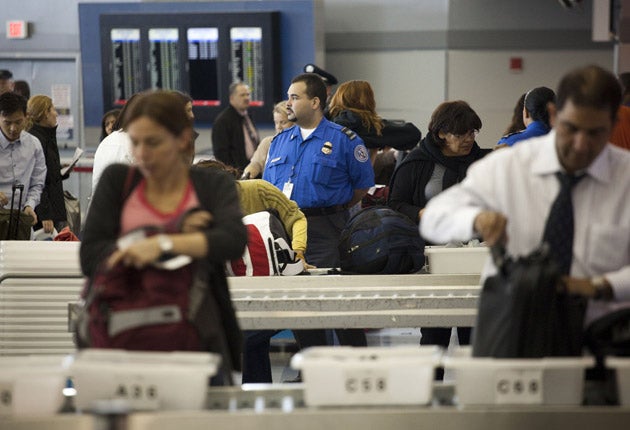BA chair and aviation chiefs call for check-in changes

Your support helps us to tell the story
From reproductive rights to climate change to Big Tech, The Independent is on the ground when the story is developing. Whether it's investigating the financials of Elon Musk's pro-Trump PAC or producing our latest documentary, 'The A Word', which shines a light on the American women fighting for reproductive rights, we know how important it is to parse out the facts from the messaging.
At such a critical moment in US history, we need reporters on the ground. Your donation allows us to keep sending journalists to speak to both sides of the story.
The Independent is trusted by Americans across the entire political spectrum. And unlike many other quality news outlets, we choose not to lock Americans out of our reporting and analysis with paywalls. We believe quality journalism should be available to everyone, paid for by those who can afford it.
Your support makes all the difference.The UK aviation industry today backed the views of British Airways chairman Martin Broughton that airport security checks needed overhauling.
Mr Broughton said some parts of the security programme were "completely redundant" and that the UK should not "kowtow" to the Americans every time the US wanted something done.
Today, Mike Carrivick, chief executive of BAR UK, which represents more than 80 scheduled airlines in the UK, said the whole question of airport security needed to be looked at.
And Colin Matthews, chief executive of airport operator BAA, spoke of "rationalising" security procedures, while former security minister Lord West said airport checks were "onerous" and had gone too far.
Mr Broughton's comments came at the annual conference of the UK Airport Operators Association in London.
He said people should not be forced to take off their shoes and have their laptops checked separately in security lines.
And there was no need to "kowtow to the Americans every time they wanted something done", especially when this involved checks the US did not impose on its own domestic routes.
The US stepped up security in January in the wake of an alleged bomb plot.
It introduced tougher screening rules, including body pat-down searches and carry-on baggage checks, for passengers arriving from 14 nations which the authorities consider a security risk.
Passengers from any foreign country also face random checks.
Mr Broughton said: "America does not do internally a lot of the things they demand that we do. We shouldn't stand for that. We should say, 'We'll only do things which we consider to be essential and that you Americans also consider essential'."
"We all know there's quite a number of elements in the security programme which are completely redundant and they should be sorted out."
These included the requirement to remove footwear, brought in after British "shoe bomber" Richard Reid hid explosives in his shoes on a transatlantic flight in 2001, as well as inconsistent approaches to laptops and other equipment.
Mr Broughton said: "Take the iPad, they still haven't decided if it is a laptop or it isn't a laptop. So some airports think you should take it out and some think you shouldn't."
Mr Carrivick said today: "There seems to be a layered approach to security at airports. Every time there is a new security scare, an extra layer is added on to procedures.
"We need to step back and have a look at the whole situation. Standards change fairly regularly and this puts pressure on airports and airlines. We need to decide what we are trying to do and how best to do it."
Mr Matthews, whose company runs six UK airports including Heathrow, added: "What we do in security in Heathrow and other airports is defined by the authorities and it's really one requirement laid on top of another.
"We could certainly do a better job for customers if we can rationalise them.
"There are some aspects which have been frustrating to everyone, but equally everyone understands we have to keep the passenger safe."
Lord West said: "I think it definitely needs to be rationalised. We have had requirement on requirement laid on top of each other and certainly I need to be convinced about all these various layers.
"I do think it does need to be rationalised because I think we have gone too far. There are too many layers, too much inconsistency."
He said the Government should take the lead, trying to secure multinational agreement on security checks.
Lord West added: "We could make them much less onerous."
Transport Secretary Philip Hammond, also speaking at the Airport Operators Association conference, said: "Security is and will remain a continuing challenge to the industry and the delivery of effective aviation security must be at the heart of the aviation policy debate.
"I have listened to your concerns regarding the need to reform the regulatory framework for aviation security.
"And I intend to develop a new regulatory system - one where the Government concentrates on setting the security outcomes that need to be achieved, and frees up operators to devise the security processes needed to deliver them in line with EU requirements."
Airline pilots' union Balpa welcomed Mr Broughton's words. Its general secretary, Jim McAuslan, said: "These procedures currently employ a 'catch all' approach, lacking true focus on the very real threat from international terrorism that faces both UK and international aviation."
Join our commenting forum
Join thought-provoking conversations, follow other Independent readers and see their replies
Comments